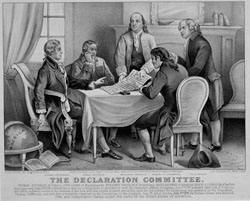Benjamin Franklin And The Revolutionary War
|
| updated |
Copy Link Code
|
 Benjamin Franklin had served for over a decade as a representative of the colonies in Britain before the outbreak of war. He was the Deputy Postmaster-General of North America and a well respected man even in the political circles of London. But Franklin always maintained his focus on what was right for the colonies. After oppressive policies such as the Stamp Act of 1765 and his visit to Ireland in 1771, where he witnessed the brutality of British rule, Franklin began to fear for the future of America under the Crown. In 1774, Franklin got a hold of secret letters from the Governor of Massachusetts asking for British troops to squash the rebellious population of Boston. Although Franklin only wished to warn the rebels in secret, John Adams made the letters public and condemned the Governor for being a traitor to his people. In the scandal that ensued, Franklin admitted his guilt only after three innocent men were charged. He was outed as a Revolutionary and sent packing by the British Parliament.
Benjamin Franklin had served for over a decade as a representative of the colonies in Britain before the outbreak of war. He was the Deputy Postmaster-General of North America and a well respected man even in the political circles of London. But Franklin always maintained his focus on what was right for the colonies. After oppressive policies such as the Stamp Act of 1765 and his visit to Ireland in 1771, where he witnessed the brutality of British rule, Franklin began to fear for the future of America under the Crown. In 1774, Franklin got a hold of secret letters from the Governor of Massachusetts asking for British troops to squash the rebellious population of Boston. Although Franklin only wished to warn the rebels in secret, John Adams made the letters public and condemned the Governor for being a traitor to his people. In the scandal that ensued, Franklin admitted his guilt only after three innocent men were charged. He was outed as a Revolutionary and sent packing by the British Parliament.
Franklin returned to Philadelphia and joined the First Continental Congress in deliberation on the possibility of independence. For Benjamin Franklin, Revolutionary War seemed inevitable and in 1776, a year after the first shots were fired at Lexington and Concord, he advised Thomas Jefferson on the drafting of the Declaration of Independence. Benjamin Franklin, during the Revolutionary War, would serve as a diplomat in France. The popularity of both Benjamin Franklin and the American Revolution were soaring in France, a country with a long history of fighting Britain. Franklin had become popular there after his kite experiments proved the electrical nature of lightning; his annual publication, "Poor Richard's Almanack" was translated to French and had a vast readership in Europe long before the war came. Franklin and his diplomatic partners, including Adams and Jefferson, were successful in securing the support of the French which would prove decisive in the outcome of the war. By the end of the conflict, Franklin was part of the delegation representing America that met with the British representatives for peace talks, culminating in the Treaty of Paris in 1783.
During the war, a personal conflict for Benjamin Franklin involved the political opposition of his illegitimate, loyalist son. William Franklin, the Tory Governor of New Jersey, was an outspoken critic of Benjamin Franklin and the Revolutionary War. When he was forced to flee his state for the safety of New York, a loyalist bastion, William continued to oversee raids into rebel territory in New Jersey. After Washington's victory at Yorktown and the subsequent loss of protection for loyalists, William was exiled to London in 1782, never to return. William had his own illegitimate son, William Temple Franklin, who was split from his father during the political turmoil before the war and raised by Benjamin Franklin, his grandfather. Temple joined his grandfather on his diplomatic mission to France and served as his secretary during the negotiations on a Franco-American alliance as well as the peace talks that led to the Treaty of Paris.
